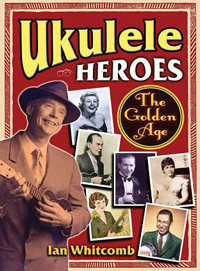For almost 80 years, Kirkus Reviews has served as the industry bible for bookstore buyers, librarians, and ordinary readers alike. Now Popdose joins the Kirkus Book Bloggers Network to explore the best — and sometimes the worst — in pop-culture and celebrity books.
This week, a critic’s hero writes about his heroes…
 Ian Whitcomb is the reason I am a critic.
Ian Whitcomb is the reason I am a critic.
That’s a bit of an overstatement, and maybe too much perfidy to lay at any one man’s door. But it is true that, more years ago than I care to remember, I ran across Whitcomb’s first book, 1972’s After the Ball: Pop Music from Rag to Rock — and I confess, Constant Reader, it CHANGED MY LIFE. Part historical survey, part musical autobiography, After the Ball crackled with wit and insight; Whitcomb’s voice was idiosyncratic, learned, and often screamingly funny. Like Greil Marcus (whose Mystery Train and Lipstick Traces were likewise important texts for me), Whitcomb excelled in drawing unexpected connections and charting secret histories — but without Marcus’s fog of pseudo-academic jive.
Perhaps Whitcomb’s greatest innovation, as an historian of pop, was the notion that pop music had a history — that it did not simply explode into being ex nihilo circa 1962. Pop music fandom has the institutional memory of a goldfish; every generation of pop fans likes to believe that they invented music, and that everything that came before was just a warm-up. It was a revelation to me to trace a straight line from the alt-rock that I dug back to earlier iterations of pop; not just to my older siblings’ David Bowie and Donna Summer records — which I’d already figured out — but to the Glenn Miller and Sara Vaughan of my parents, and the parlor songs of their parents, back into a netherworld of vaudeville and the music hall, of song-pluggers and minstrel shows, before the advent of recorded music, when there was a piano in every home and the commercial success of a song was measured in how many copies of the sheet music were sold.
With my mind thus blown, what was a poor boy to do but make a career out of drawing cultural connections? There was no hope for me after that.
His latest book, Ukulele Heroes: The Golden Age, is typically Whitcombian in its eccentricity, looking at the history of pop through the prism of the titular instrument. Within such a tight framework, Whitcomb finds narrative threads that lead far afield …
Read the rest of this article at Kirkus Reviews!





Comments